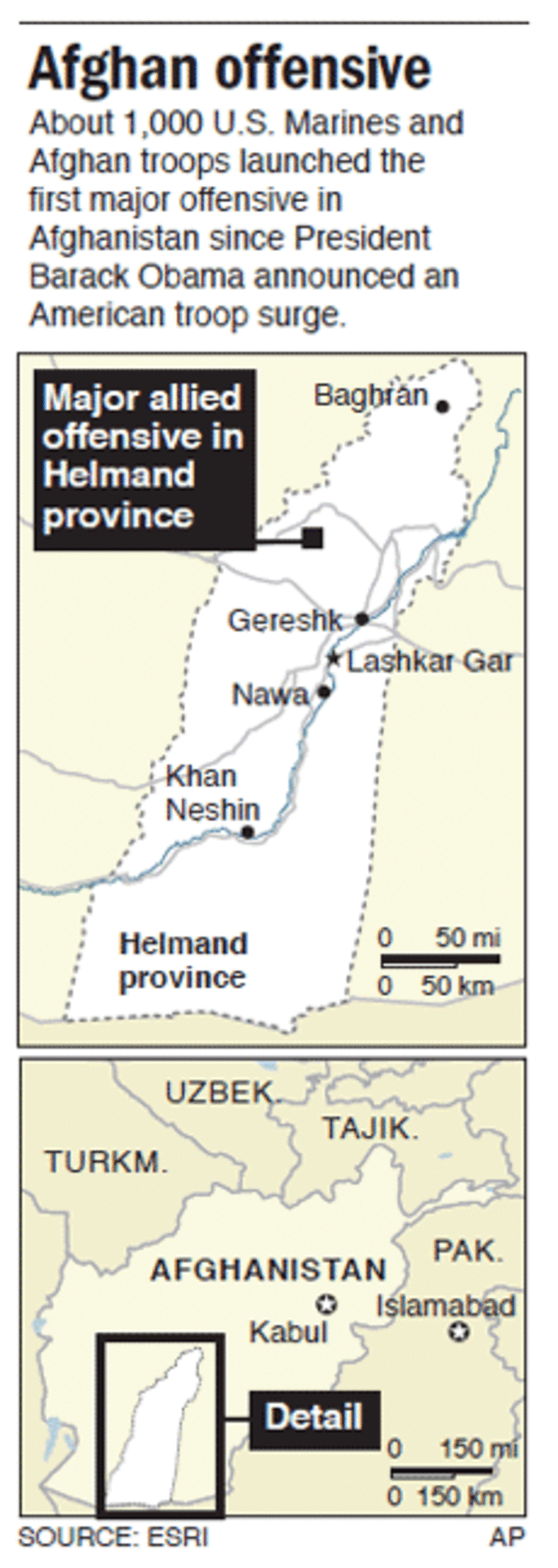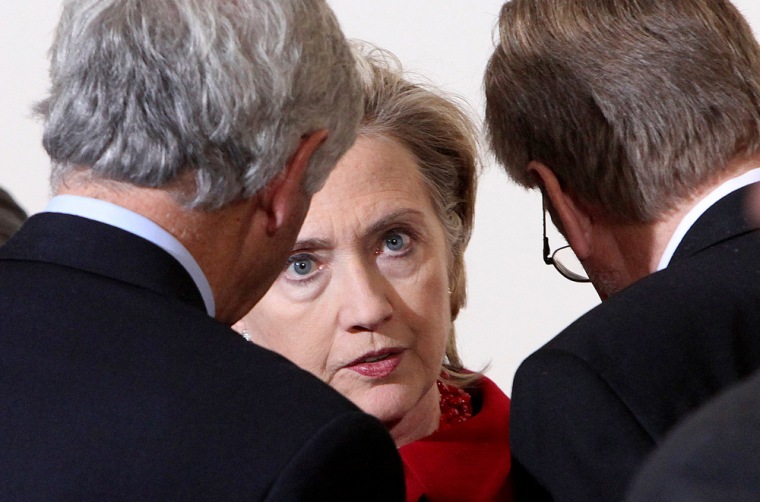Some two dozen countries will send an estimated 7,000 more troops to Afghanistan next year, the chief of NATO said Friday as U.S. Secretary of State Hillary Rodham Clinton told her allied counterparts that an infusion of forces is crucial to turning the tide in the long war.
NATO Secretary General Anders Fogh Rasmussen of Denmark told reporters at NATO headquarters that at least 25 nations would provide the additional forces in Afghanistan in 2010, "with more to come." And he said the 44 countries now involved are "absolutely united" in their commitment to seeing the eight-year war through to a successful outcome.
The troop estimate was 2,000 higher than the 5,000-strong pledges that Ramussen cited Tuesday, after President Barack Obama announced his decision to bolster the United States' war effort. Obama said he will send 30,000 more U.S. troops to Afghanistan by next fall.
"The strongest message in the room today was solidarity," Rasmussen said. "Nations are backing up their words with deeds."
U.S. Navy Adm. James Stavridis, the top NATO and U.S. commander in Europe, said in an Associated Press interview during a break in the talks that he believes several thousand more non-U.S. troops may be contributed next year, in addition to the 7,000 cited by Fogh Rasmussen.
"What we are all underlining to potential troop contributors is that we are truly asking for emphasis in the training area," Stavridis said. "And what I'm hearing is that we'll get very good responses."
‘Urgent’ need for foreign forces, Clinton says
Clinton told allied foreign ministers that it was essential that contributions to the war effort be provided as quickly as possible. She thanked Italy and Britain for their announcements of new troop contributions and said nonmilitary assistance is equally important.
"The need for additional forces is urgent, but their presence will not be indefinite," she told the North Atlantic Council, NATO's highest political council.

She cited President Barack Obama's pledge on Tuesday to begin withdrawing U.S. forces in July 2011.
"At that time, we will begin to transfer authority and responsibility to Afghan security forces removing combat forces from Afghanistan over time with the assurance that Afghanistan's future, and ours, is secure," Clinton said, according to a copy of her prepared remarks to the closed-door meeting.
"The pace, size, and scope of the drawdown will be predicated on the situation on the ground. If things are going well, a larger number of forces could be removed from more areas. If not, the size and speed of the drawdown will be adjusted accordingly."
In his remarks to reporters, Fogh Rasmussen made a similar point.
"Transition (to Afghan control) does not mean exit," he said.
‘Our people are weary of war’
Clinton acknowledged the sacrifice, in blood and treasure, that many allied countries have paid in Afghanistan over the past eight years.
"Today, our people are weary of war," she said. "But we cannot ignore reality. The extremists continue to target innocent people and sow destruction across continents. From the remote mountains of Afghanistan and Pakistan, they plot future attacks. As Secretary General Rasmussen said earlier this week, `This is our fight, together.' And we must finish it together."
She thanked Italy for its announcement that it will send another 1,000 troops, and for Britain's pledge of another 500.
"I look forward to discussing further commitments with many of you today and in the coming days," she said. "Additional troops, enhanced support for the vital training mission, and added civilian assistance will help deny al-Qaida a safe haven, reverse the Taliban's momentum, and strengthen the capacity of the Afghans to take responsibility for their own security."
No specific breakdown of commitments
Fogh Rasmussen provided no breakdown of the 7,000 troops expected. But other NATO officials, speaking to The AP on condition of anonymity because the figures were not being publicly released, said firm commitments totaled about 5,500, with roughly another 1,500 expected on the basis of unspecified "indications" from certain countries.
There are now about 38,000 non-U.S. foreign troops in Afghanistan, along with some 70,000 U.S. troops. The additional U.S. troops to be sent by Obama and the foreign commitments cited by Fogh Rasmussen would take the overall total to about 145,000 by the end of next year.
The Afghan national army now has about 97,000 soldiers and is scheduled to grow to 134,000 by next October.
Delicate balance
Clinton sought to strike a delicate balance between stiffening allied resolve for hard combat in Afghanistan while also promising that it will not last for decades.
"Even as we signal resolve through the deployment of additional forces and a long-term civilian commitment, we want to send a signal that our combat presence is not permanent, and to provide a sense of urgency to the Afghans to do for themselves what we know they're capable of doing," she said.
"But I want to stress that this timeframe does not mean that we can or will end our commitment to Afghanistan, Pakistan, or the region. Our political, economic, and diplomatic presence in the region will endure. I know that this has not always been the case in the past, but we intend the future to be different than the past."
The central theme of her remarks was a need for unity of purpose.
"We are in this together. And only together can we succeed," she said.
